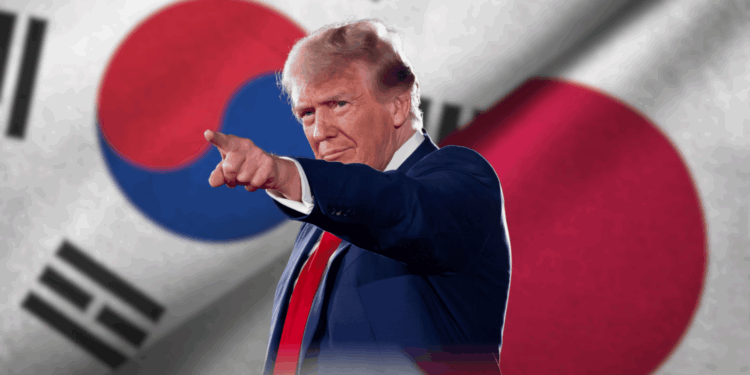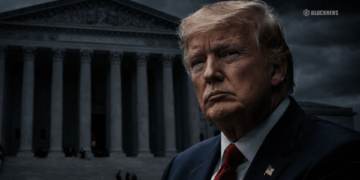- Trump announces 25% blanket tariffs on all Japanese and South Korean imports, effective August 1, via letters posted on Truth Social.
- Markets react with sharp losses, with the Dow falling 447 points and the S&P 500 and Nasdaq also down amid renewed trade war fears.
- Tariffs are justified by Trump as a response to trade deficits, despite widespread criticism from
In a move that’s already rattling global markets, former President Donald Trump announced Monday that the United States will impose 25% blanket tariffs on all imports from Japan and South Korea starting August 1. The decision was revealed via screenshots of formal letters posted to Trump’s Truth Social account, addressed to Japanese Prime Minister Ishiba Shigeru and South Korean President Lee Jae-myung.
Tariffs Separate from Sector-Specific Duties
The letters clarified that the 25% blanket tariffs will be enforced independently of any additional sector-specific duties, signaling that further economic pressure could be coming to specific industries. Trump’s message also emphasized a crackdown on “transshipping”—the practice of routing goods through third countries to avoid tariffs—with a warning that such tactics would be met with the higher tariff rate.
The decision appears to be part of a larger wave of renewed “reciprocal tariffs” expected to roll out between July 8 and July 10, potentially targeting over a dozen countries.
U.S. Markets Dip on Tariff News
Wall Street did not take the news lightly. U.S. financial markets fell to session lows following the announcement. The Dow Jones Industrial Average dropped 447 points (1%), while the S&P 500 and Nasdaq Composite slid 0.8% and 0.9%, respectively. The tariffs add fresh uncertainty to an already delicate global trade landscape and could reignite geopolitical tensions between key U.S. allies and the White House.
Trade Deficit Rationale Under Scrutiny
Trump’s justification for the tariffs centers around correcting the persistent U.S. trade deficits with Japan and South Korea—$68.5 billion and $66 billion, respectively, in 2024. Trump has long argued that these imbalances reflect unfair trade practices, though many economists dispute that narrative. They note that trade deficits are not inherently harmful and often reflect broader economic factors such as consumer demand and capital flows.














